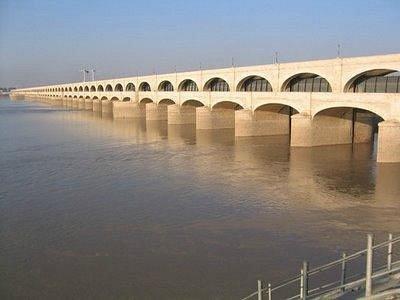Water Dispute
The Punjab government has formally raised its voice against what it calls a persistent and unjust water distribution pattern favoring Sindh, by submitting a letter of protest to the Indus River System Authority (IRSA).
This move comes in response to growing protests and narrative-building by the Sindh government and various nationalist groups accusing Punjab of water theft.
In the letter, the Punjab government strongly refutes Sindh’s claims and expresses serious concerns about the current state of inter-provincial water distribution.
Citing credible sources, the letter alleges that Sindh is receiving unauthorized water at the Sukkur Barrage via the Rice Canal — a situation that, according to Punjab, has been deliberately concealed from the national discourse.
Punjab has adopted a firm stance, claiming that while Sindh is being given more than its allocated share of water, Punjab is suffering from under-supply. This alleged disparity, officials warn, is intensifying unrest among Punjab’s farming communities and could potentially trigger serious law and order concerns in the region.
The letter further highlights that the technical and advisory decisions made in IRSA’s March meetings have not been implemented. According to Punjab’s Irrigation Department, it was agreed — in the presence of all four provincial irrigation secretaries — that water would be released to Punjab’s Trimmu, Panjnad, and Chashma canals.
Additionally, it was decided that to ease the pressure on Mangla Dam, water for Punjab’s TP and CJ canals would be drawn from Tarbela Dam. However, Punjab claims that these decisions have not been honored, leading to a significant imbalance.
Due to the non-release of water from Tarbela, Punjab is now being forced to extract between 17,000 and 20,000 cusecs from Mangla Dam — despite only 8,000 cusecs having been scheduled. This over-reliance on Mangla threatens to disturb the overall water storage equilibrium.
The Punjab government also pointed to previous seasonal imbalances, stating that during the Rabi season, there was an overall 16% water shortage. Within this shortfall, Punjab received 22% less water than allocated, compared to Sindh’s 19% reduction.
The disparity has worsened in the current Kharif season, which has already witnessed a 43% nationwide water shortage. Yet again, Punjab alleges that it is being disproportionately affected.
Punjab’s letter calls upon IRSA to ensure equitable water distribution and to urgently rectify the ongoing injustices by providing Punjab with its fair share. The government emphasized that continued neglect of agreed-upon allocations could further deepen inter-provincial mistrust and disrupt agricultural productivity across Punjab.










